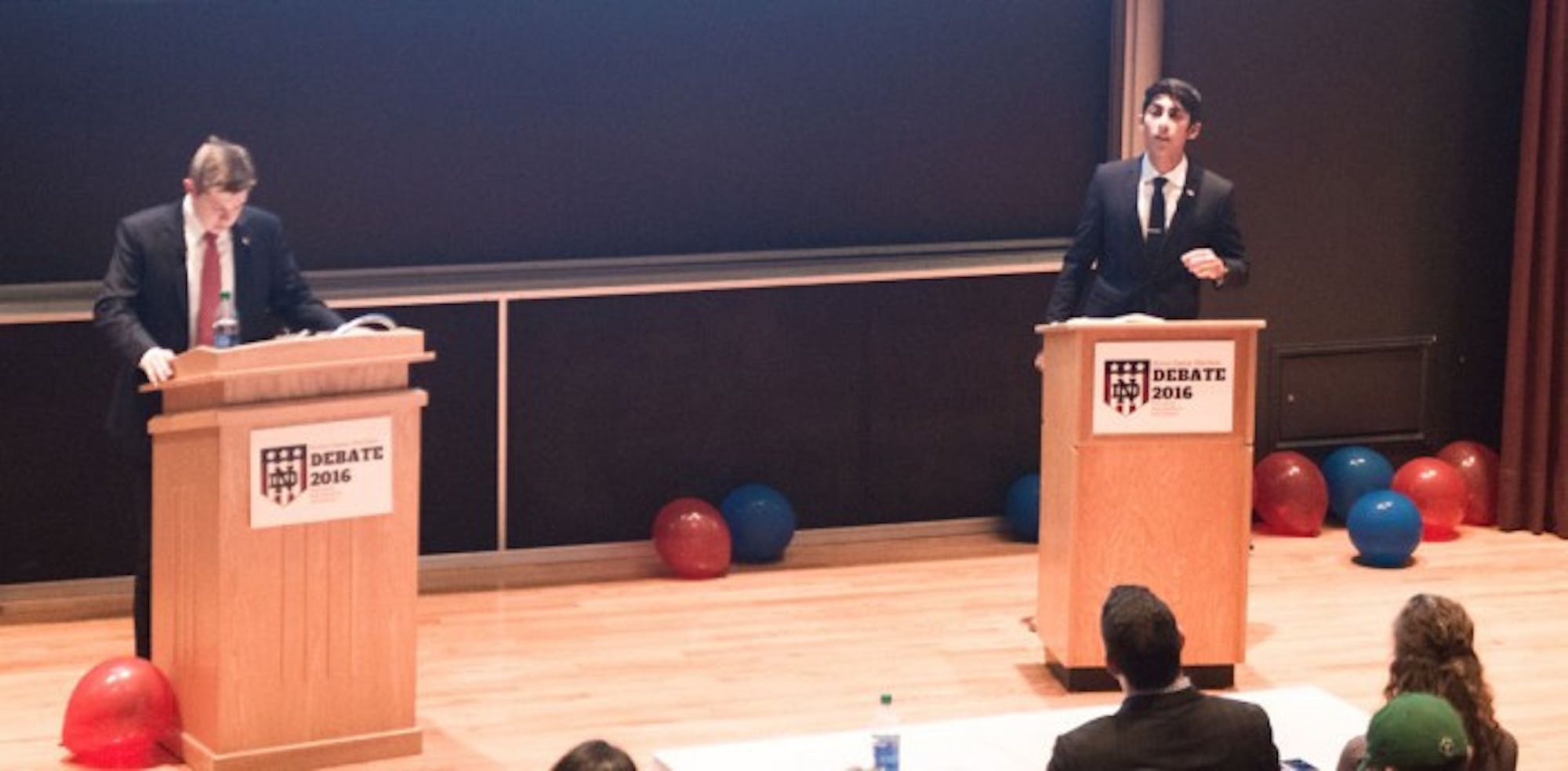This past Wednesday, the series of debates between presidential candidates Hillary Clinton and Donald Trump drew to a close. But on Tuesday night, debate between students at Notre Dame raged on. In a packed auditorium in DeBartolo Hall, sophomore Prathm Juneja, representing Democrats, and junior Will Lederer, representing Republicans, debated in an event sponsored by NDVotes, Student Government, College Republicans and College Democrats.
Moderator Alexander Heffner, host of “Open Mind on PBS,” started the debate by asking students about their opinions on the state of voting rights in America.
Juneja began by saying that he believes restrictions are a major problem.
“Party policies and partisan politics have brought us to a place where in Texas, voter ID laws were passed and a few days later, DMVs in minority neighborhoods were shut down,” Juneja said. “That’s the problem — the idea that people don’t have the opportunity to vote because of the color of their skin or their zip code.”
Lederer countered, saying that IDs were necessary when voting in order to have integrity in the electoral process.
“You need an ID law to buy a pack of cigarettes, alcohol and even to get food stamps,” Lederer said. “So when Democrats argue that it's too expensive for minorities or hurts minorities, you need ID to get food stamps. So it’s not that expensive.”
In sticking with the theme of domestic issues, Heffner moved the conversation to a discussion of President Obama’s signature healthcare law, the Affordable Care Act (ACA), and recent problems associated with its implementation.
Lederer criticized the law heavily, saying that it had been, “unfortunately, for the American people, a failure.”
“Premiums are up $3,700,” he said. “Obama promised they would be down $2,500.”
Lederer went on to discuss what he believed to be the most effective way to expand affordable healthcare.
“Competition is the cornerstone of our economy — we are a free market economy,” he said. “We [should] allow insurance companies to come into the system [and] compete for rates. But we need regulation.”
Juneja applauded the expansion of healthcare under the ACA but acknowledged problems that needed to be addressed, citing Clinton’s plan as an example.
“Hillary Clinton plans on expanding tax credits to make sure that citizens who are investing in Obamacare with the price hikes can get health insurance,” Juneja said. “She plans on increasing competition through a public option.”
The debate moved beyond domestic issues and into topics relating to foreign policy, such as global climate change and the refugee crisis created in the wake of the Syrian civil war.
Juneja stressed the importance of dealing with the threat of climate change.
“Just last year, 350,000 lives were lost to climate change. That’s not a number we normally hear. Because of heat waves, because of rising ocean levels that haven’t hit America yet but will in the future,” Juneja said, adding that hurricanes were another example of climate change’s effects.
Lederer contested these claims, saying he does not think Americans can “directly attribute climate change to hurricanes.”
“I think climate change is a very important issue to investigate and something we should get more data on, but I don’t think it should be at the top of our priorities,” he said. “We need to focus on our energy first.”
When speaking on the refugee crisis, Lederer cited historical precedent to justify his view on restricting the acceptance of refugees from Syria.
“Never in the history of America has it been our policy to bring in people because they have a refugee status,” Lederer said. “Under Bill Clinton, [with] the Hutus and Tutsis of Rwanda — it was never our policy to bring them into our country. In fact, Bill Clinton largely ignored the Hutu and Tutsi crisis.”
Juneja once again cited Hillary Clinton’s plans when discussing how he would address the refugee crisis.
“What we are looking for is the opportunity to save lives. The Hillary Clinton plan saves 65,000 lives a year,” Juneja said, “I disagree with the idea that someone’s life, because they are a citizen of America, is so much more important.”
Once the debate had concluded, students expressed their opinions on the debate. Sophomore Christopher Carbonaro said he believed that Juneja could’ve expressed his own views better.
“Although I agree with Prathm’s views, I think that he needed to differentiate himself from Hillary Clinton a bit more and sound less like he’s vouching for her,” Carbonaro said. “Instead, he needed to state his own claims and state what he believes in.”
Debate commissioner Corey Gayheart, a sophomore, said he felt the debate was successful.
“I thought the debate went very well — at times it started to get heated,” he said. “We wanted to create a broad civic discussion about the issues affecting America, especially in today’s political climate where so much has been focused on horse race journalism and kind of the Hollywood side of the candidates and the race.”













